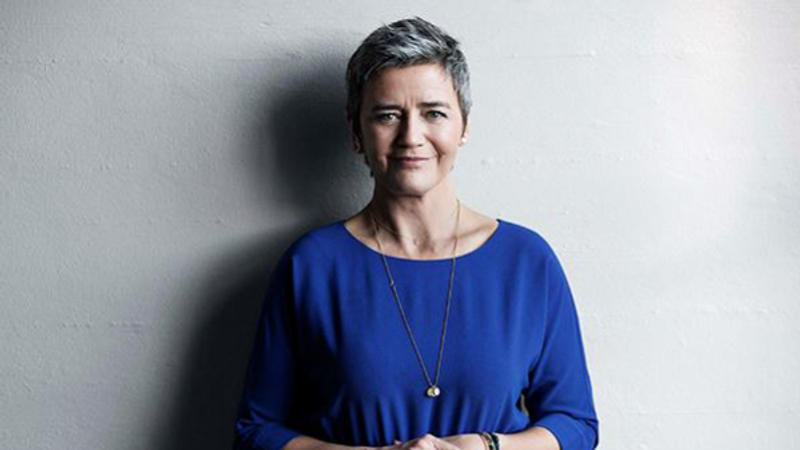Published 17:18 IST, August 27th 2024
New EU antitrust tsar has better tools, harder job
Vestager will not return for a third term as the EU’s most powerful antitrust official as the Danish government is set to nominate a different candidate.

Marge out the way. Europe is about to get a new antitrust supremo. While Ursula von der Leyen will continue as president of the European Commission for the next five years, Denmark’s long-serving competition commissioner Margrethe Vestager will not, according to the Financial Times. Her replacement has sharper regulatory tools, but a harder environment in which to wield them.
Traditionally the key responsibility of DG Comp, as the Directorate-General for Competition is known, has been to crack down on market abuse and anticompetitive behaviour in the 27-state European Union. Vestager, whose tenure has spanned two commissions back to 2014, is seen by Brussels veterans as a hard act to follow. That’s not necessarily because everything she touched turned to gold: her requirement for Apple to fork out 13 billion euros of unpaid tax plus interest to Ireland has suffered legal setbacks, as have tussles with Qualcomm and Fiat. Still, multibillion-euro fines for U.S. Big Tech and the blocking of the 2019 Siemens-Alstom rail merger showed a capacity to protect the integrity of the single market. Her as yet unknown replacement will find that tougher to do.
This isn’t because the new antitrust tsar will lack theoretical heft. Vestager’s drive to penetrate the so-called “walled gardens” of giants like Apple, Alphabet’s Google and Amazon – which she alleged act anticompetitively to preserve their monopolies – has been partly responsible for handing DG Comp enhanced powers. The Digital Markets Act means Brussels constantly monitors Big Tech “gatekeepers” and can levy fines of up to 20% of global revenue promptly if need be, rather than having to wade through years of investigations for those deemed to have done something wrong. And under the Foreign Subsidies Regulation, EU antitrust enforcers can clamp down on Chinese electric vehicle makers like SAIC Motor even if their cars are built in European factories, on the basis that they may still benefit from Beijing handouts.
Yet the political backdrop in 2024 is markedly different from 2014. Following the pandemic and Russia’s 2022 invasion of Ukraine, which upended European energy markets, Brussels has waived key state aid rules. Richer countries like Germany have filled their boots. Berlin accounted for 52% of the overall 141 billion euros of corporate subsidies granted by member states between March 2022 and June 2023. It’s hard to argue to smaller countries like Ireland and Denmark that the single market currently represents a level playing field.

Click here for an interactive version of the graphic.
The risk, in fact, is that DG Comp’s emphasis on single market integrity starts to look quaint. Influential EU voices see a need to face down Chinese competition, and potentially that of the United States should Donald Trump win the November presidential election. Paradoxically, among the loudest of these is internal market commissioner Thierry Breton, with whom Vestager has been perpetually at odds. He is a relentless lobbyist for robust European industrial policy, arguing it would enable the bloc to be competitive in fields like green energy and tech. If this need to protect national champions becomes a priority in Brussels, a Franco-German heavyweight merger like Siemens-Alstom would be more likely to be approved.
For M&A bankers and acquisitive CEOs sitting in London or New York, there’s opportunity in all this. If Vestager’s replacement were to get shouted down by industrial policy champions, more of their deals might get waved through. Yet a more permissive DG Comp could be a double-edged sword for any company that wants to operate in the EU. It might be a good thing to prevent U.S. Big Tech giants from turning current modest investments in European artificial intelligence startups like France’s Mistral into controlling stakes, and thereby constructing new walled gardens. Yet as with electric vehicles and other green tech, a blanket ban on foreign deals might equally strangle AI innovation.
The Foreign Subsidies Regulation is a similarly difficult tool to wield. It has already been notably unleashed in Bulgaria, where it prompted a subsidiary of Chinese rail group CRRC to withdraw from a tender for train production and maintenance work, presumably because it might have fallen foul of the EU’s focus on subsidy-aided bids. But deploying the tool frequently could lead to Chinese countermeasures that would enrage German exporters to the People’s Republic.

The names currently being mentioned for Vestager’s replacement include Breton himself, which sounds like a mistake given his sympathies to industrial policy. Others, like Dutch climate commissioner Wopke Hoekstra and Belgian justice commissioner Didier Reynders, make more sense. According to Brussels insiders, previous antitrust experience is less important than a willingness to master complex briefs, to have astute political antennae, and most importantly to ally with smaller member states to stop Germany and France shoving everyone else around.
Mario Monti, the former Italian prime minister and competition commissioner between 1999 and 2004, makes for a decent role model. But whoever the EU’s new antitrust supremo is, they will have to show toughness – in a much less hospitable environment.
Context News
Margrethe Vestager will not return for a third term as the European Union’s most powerful antitrust official as the Danish government is set to nominate a different candidate as its European commissioner, the Financial Times reported on Aug. 16. Officials in Copenhagen told the FT that the Danes would not be choosing Vestager, whose Social Liberal party did poorly in Denmark’s 2022 elections and is no longer part of the ruling coalition.
Updated 17:18 IST, August 27th 2024
